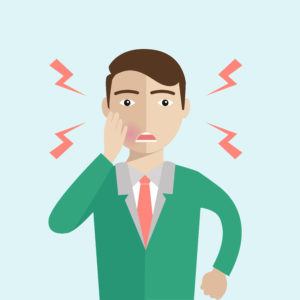If you’re one of the estimated ten million Americans who suffers from Temporomandibular Joint (TMJ) pain or a Temporomandibular Joint Disorder (TMD) you, may be wondering how you struck the bad-luck lottery and ended up with this often-debilitating disorder. TMJ pain is classified as pain and dysfunction of the jaw joints and related muscles. TMD can cause anything from pain in the face, jaw, and neck, to difficulty speaking, opening the mouth, chewing, muscle pain, stiffness, altered bite alignment, and even migraines. So, what causes this type of pain? Some of the answers may surprise you!
-
Genetics
Though most TMJ disorders are caused by external factors, about 15% of all TMJ disorders are genetic. This may seem like a bad thing, but even genetic TMD responds well to treatment- plus, you get the benefit of advanced warning that you may be more susceptible to one if it is common in your family tree.
-
Braces
It may seem counterintuitive that the very devices used to treat a bad bite could trigger a disorder that’s caused by a bad bite. But in some cases, forcing the muscles of the jaw to realign can cause TMJ pain. If you wear braces or other orthodontic devices and are experiencing TMJ pain, speak with your dentist or orthodontist about adjusting your appliances. A minor adjustment here or there may help ease some of the discomforts.
-
Grinding Teeth
You may not even realize you grind your teeth while you sleep- in fact, some people aren’t even aware they’re doing it during the day- but clenching or grinding your teeth can be a big TMD trigger. Teeth grinding can be doubly problematic because, in addition to TMJ pain, it can also wear down your teeth, causing chips and cracks that may make your teeth more susceptible to cavities. A great solution to both the TMJ pain and tooth damage associated with teeth grinding is a mouthguard or night guard. Many over the counter guards are available for very little money, but may not be comfortable- but a custom guard made right at your dentist’s office is not only more comfortable, many are nearly invisible and work well for daytime wear.
-
Medicine
Certain medicines may exacerbate TMJ pain, such as serotonin reuptake inhibitors (SSRI’s) which are used to treat clinical depression.
-
Drugs and Alcohol
You already know that abusing drugs and alcohol is horrible for your entire body- but it also can make your TMJ pain worse, because the overstimulation from these addictions can increase teeth grinding.
-
Stress and Anxiety
When we are stressed or anxious, we may be more likely to grind our teeth, but also to hold tension in our muscles. If we are constantly tense or rigid, we can put added strain on our jaw, even if our teeth aren’t touching.
-
Accidental Injury
Patients who have been in automobile accidents and have experienced whiplash or who have hit their face or head on a steering wheel or airbag could easily damage the temporomandibular joints and muscles. When a car is ‘rear ended’ the force on the neck can cause the jaw to open, and pressure to be applied to the TMJ.
-
Arthritis
Yes, unfortunately, you can get arthritis anywhere- including the joints in the jaw. Much like TMD’s, arthritis is not just one illness but a family of illnesses that affect the joints, causing pain, swelling, stiffness, and decreased range of motion. In fact, there are over one-hundred different types of arthritis!
While it definitely helps to know what is causing your TMJ pain, even if it’s a complete mystery we can still treat and possibly eliminate your TMJ disorder and pain. Treatment begins by performing scans to measure the activity of the muscles in your jaw. We then use a special device called a Tens unit to stimulate the nerves and relax the muscles of the jaw, this part of the process can actually give you pain relief as it’s being conducted! A third device is then used to calculate your best point of bite balance. From there, a custom orthotic is created to help align the jaw. With repeated use of your custom orthotic, TMJ pain should subside, and more permanent solutions to your TMD can be explored, such as crowns, braces, or continued orthotic use.
If you’re interested in making an appointment to get help for your TMD symptoms, give Dr. George’s office a call at 724-934-3422.


